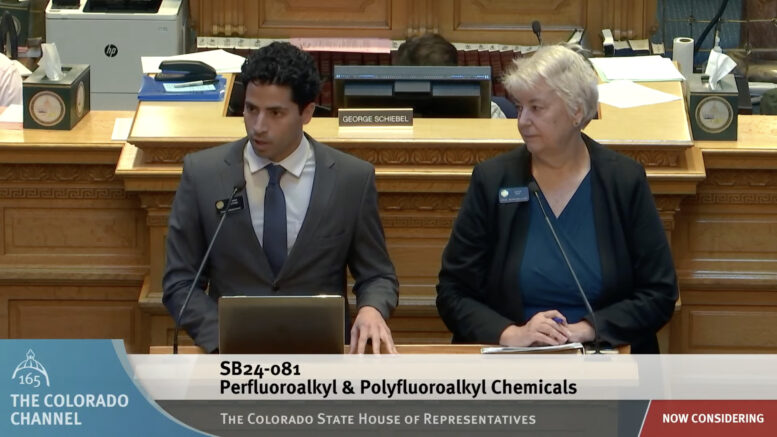Environmental advocates this week celebrated a new law that got overshadowed by debate on air-quality regulations this past legislative session — a measure expanding the products whose sale will be banned in Colorado if they contain intentionally added PFAS.
Perfluoroalkyl and polyfluoroalkyl chemicals, known as “forever chemicals” or PFAs, are chemicals resistant to water and grease that have been added to consumer products ranging from clothing to cookware since the 1940s to improve their performance. The properties that make these chemicals resistant to breaking down on products mean they don’t dissolve easily in water, and studies have traces of PFAS, which can cause health problems from fertility issues to cancer, in most water supplies and humans.
Senate Bill 81 bans Colorado sale of cleaning products, cookware, dental floss, menstrual products and ski wax with intentionally added PFAS in 2026 and adds textile articles, commercial cookware and outdoor apparel for severe wet conditions to the list in 2028. The bill, which went into effect on May 1, expands on a 2022 law that’s already banned state sales of PFAS-added carpets, cosmetics, fabric treatments, food packaging, juvenile products, oil and gas fluids, textile furnishings and upholstered furniture.
PFAS bill underwent changes
As introduced, SB 81 sought to nix sales of even more PFAS-added products and then ban sale of any product with intentionally added PFAS by 2032. Such a wide-ranging ban would have been “devastating” to industries from aerospace to medical equipment, business leaders asserted, and the bill was cut down into its current shape.
Still, supporters, led by the Colorado Public Interest Research Group, got together Tuesday to celebrate what was accomplished, calling SB 81, sponsored by Democratic Sen. Lisa Cutter of Morrison, a win both for consumer safety and for water-treatment plants. The U.S. Environmental Protection Agency in April lowered from 70 parts per trillion to four parts per trillion the levels of PFAS that were acceptable in water supplies, leaving treatment plants with the burden of cleaning PFAS from their supplies.

Colorado state Sen. Lisa Cutter speaks about her PFAS bill during an event Tuesday.
“PFAS are the last thing we want getting into our water because they are called forever chemicals for a reason – they are meant to last,” CoPIRG Executive Director Danny Katz said at the supporters’ celebration at the Metro Water Recovery Plant in Brighton. “I’m glad Colorado is leading the way in stopping PFAS from the source, including so many of the products we have in our homes, unknowingly adding PFAS into our community.”
Further bans possible from Legislature
Business leaders, while highly opposed to the bill in its original iteration, were pleased with many of the changes made during its legislative journey. Still, Sen. Larry Liston, R-Colorado Springs, channeled many of their concerns when he warned on the Senate floor before the Democrat-led, fully partisan passage of SB 81 that it still could be a “huge problem” for affected industries.
And even as supporters lauded the new law, several suggested that they are not done looking to expand the ban on PFAS-added products. Sponsoring Rep. Cathy Kipp, D-Fort Collins, said during April debate in the House that backers “didn’t get everything we wanted,” and Cutter on Tuesday said legislators must continue to impose limits and phaseouts so that companies are motivated to seek alternative materials.
“I’m proud of the work we’ve done in Colorado to limit the use of PFAS, but we must continue to work on this issue to protect the health and safety of our communities,” Cutter said in a news release issued by CoPIRG.
